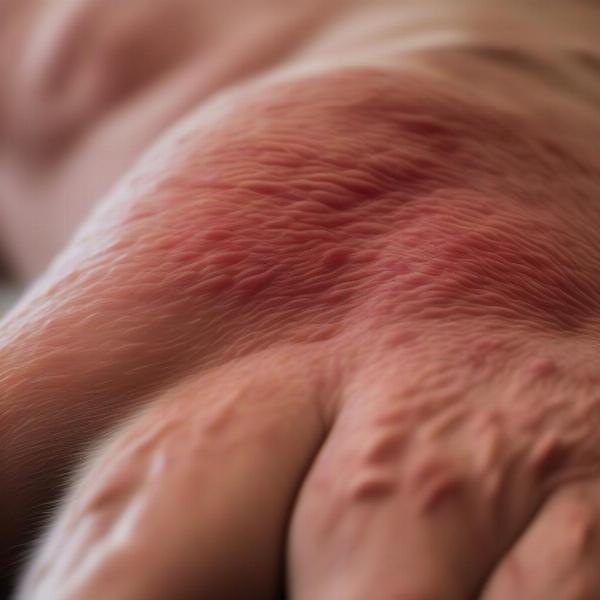If your dog is constantly itching, sneezing, or licking their paws after a romp in the grass, they might be allergic to it. Grass allergies in dogs are a common issue, causing discomfort and frustration for both pets and owners. This guide will provide you with everything you need to know about managing grass allergies in dogs, from identifying the symptoms to exploring treatment options.
Understanding Grass Allergies in Dogs
Grass allergies are a type of environmental allergy, also known as atopy. They occur when a dog’s immune system overreacts to proteins found in certain types of grass pollen. While any dog can develop allergies, some breeds, such as Terriers, Retrievers, and Setters, are more predisposed. The most common culprit is Bermuda grass, but other types like Kentucky bluegrass, ryegrass, and fescue can also trigger allergic reactions.
Identifying the Symptoms
Recognizing the signs of a grass allergy is crucial for prompt treatment. Common symptoms include:
- Itching and scratching: Excessive itching, especially around the paws, face, ears, and belly.
- Red and inflamed skin: Skin may appear irritated, red, and even develop sores from constant scratching.
- Sneezing and runny nose: Similar to human allergies, dogs may experience respiratory symptoms.
- Excessive licking: Constant licking of paws and other affected areas.
- Ear infections: Allergies can predispose dogs to secondary ear infections.
 Dog with Red Skin from Grass Allergy
Dog with Red Skin from Grass Allergy
Managing Grass Allergies: Treatment and Prevention
While there’s no cure for grass allergies, several management strategies can significantly reduce your dog’s discomfort.
- Medications: Your veterinarian may prescribe antihistamines, corticosteroids, or other medications to control the allergic reaction.
- Immunotherapy: Allergy shots can help desensitize your dog to the allergen over time.
- Regular Bathing: Frequent baths with a hypoallergenic shampoo can remove pollen and soothe irritated skin. what to do for dry skin on dogs
- Paw Cleaning: Wipe your dog’s paws after walks to remove pollen.
- Environmental Control: Limiting exposure to grass by walking your dog on pavement or during times when pollen counts are lower can help.
- Dietary Supplements: Omega-3 fatty acids and other supplements can support skin health.
Can a Dog Be Allergic to Only Certain Types of Grass?
Yes, dogs can be allergic to specific types of grass. Just like humans, dogs can develop sensitivities to particular proteins found in different grass species.
What Can I Give My Dog for Grass Allergies at Home?
While home remedies can provide temporary relief, always consult your veterinarian before trying any new treatments. A cool bath with oatmeal shampoo can soothe itchy skin.
Living with a Grass-Allergic Dog
Managing a dog’s grass allergy requires diligence and patience. By working closely with your veterinarian and implementing appropriate strategies, you can help your furry friend live a comfortable and happy life, even with allergies.
FAQ
- How can I test my dog for grass allergies? Your veterinarian can perform skin or blood tests to diagnose allergies.
- Are grass allergies seasonal? Yes, they are typically worse during pollen season, which varies depending on your location.
- Can puppies have grass allergies? Yes, allergies can develop at any age, even in puppies.
- What are some signs of severe allergic reactions in dogs? Difficulty breathing, facial swelling, and hives are signs of a severe reaction and require immediate veterinary attention.
- Can changing my dog’s diet help with grass allergies? While diet alone won’t cure allergies, a healthy diet can support overall skin and immune health.
- Is there a way to prevent grass allergies in dogs? Unfortunately, there’s no surefire way to prevent allergies, but minimizing exposure to allergens can help.
- Are there certain breeds more prone to grass allergies? Yes, some breeds, like Terriers and Retrievers, are more susceptible.
Related Articles:
ILM Dog is your one-stop resource for all things dog-related. From breed selection to health and training, we offer expert advice and valuable resources to help you provide the best possible care for your canine companion. We specialize in Dog Breeds and Selection, Dog Health and Medical Care, and Dog Grooming and Hygiene. For further information or personalized guidance, contact us via email at [email protected] or phone at +44 20-3965-8624. ILM Dog is dedicated to helping you and your dog live a happy and healthy life together.